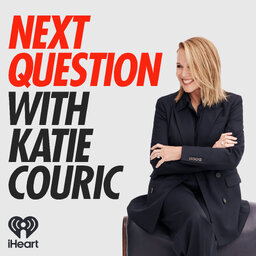Bonus: An interview with Dr. Anthony Fauci
On this special episode of Next Question with Katie Couric, Katie shares an important conversation with Dr. Anthony Fauci. As Director of the National Institute of Allergy and Infectious Diseases for nearly 40 years, Fauci has advised six presidents and led the fight against emerging diseases including H.I.V., SARS, MERS, and Ebola. Most recently, as the coronavirus pandemic unfolds, he’s taken on the crucial role of America’s explainer-in-chief, breaking down complicated science clearly and providing a trusted, calming presence as our country endures the most devastating public health crisis of our lifetimes. In this wide-ranging conversation, Katie and Dr. Fauci take a deep dive into the issues on all of our minds right now - how to protect ourselves as flu season nears, where we are in the race to find a vaccine, what we should know about sending our kids to school, whether the world has entered a “pandemic era” -- and what exactly that could mean for all us of going forward.
Learn more about your ad-choices at https://www.iheartpodcastnetwork.com
 Next Question with Katie Couric
Next Question with Katie Couric


